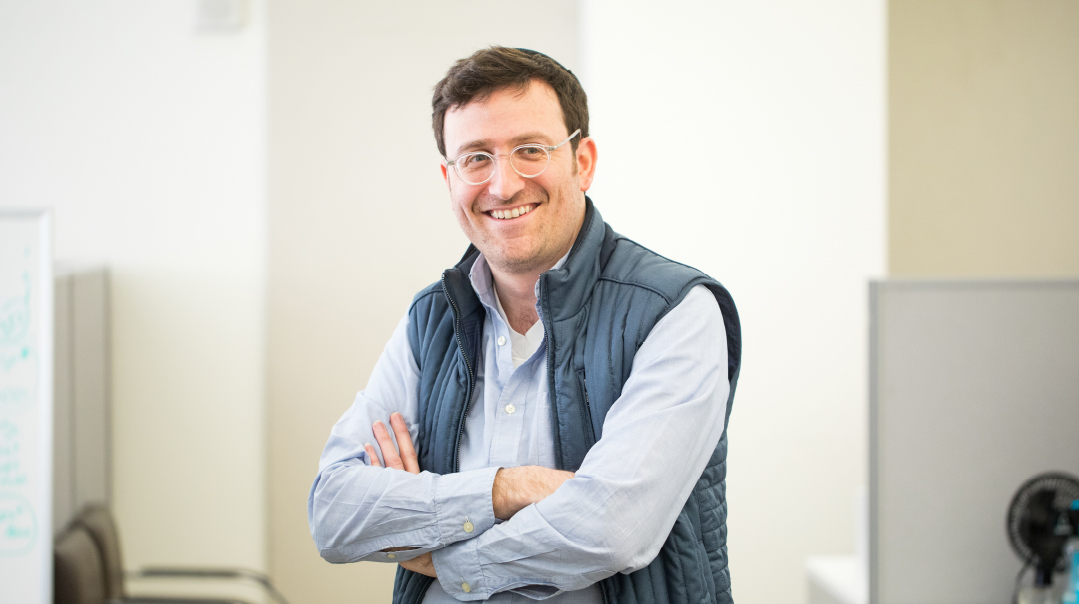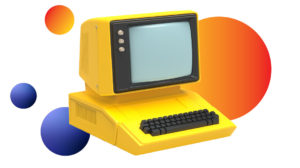FULL SPEED AHEAD


MEET NATHAN HECHT, FOUNDER AND CEO OF CAR-LEASING APP, RODO
Sometimes you meet a person and you can just feel the entrepreneurial spirit radiating from him. That’s the vibe you get when you meet Nathan Hecht. He’s a person who’s greatly motivated by his long-term goals, though he finds the journey of working toward them to be just as thrilling.
After talking to Hecht for even a few minutes, you get the impression that while the idea he’s building is important, it doesn’t matter as much as the impact he wants to create. Hecht has proven that through the variety of industries he’s worked in — moving from entrepreneurial ventures in the military sphere and cryptocurrency to, currently, the auto industry, with his app, Rodo (known as Honcker until recently). He follows each passion closely, noticing where opportunity lies untouched. “When I saw a problem in car leasing, I couldn’t not do anything about it,” he explains. “I had a difficult personal experience trying to lease a car in New York, so after that, it was a no-brainer to start Rodo. It happened very quickly.”
The experience he’s referring to occurred when he tried to lease a Nissan Maxima advertised for $269 a month. After spending a full day completing an application, he was told the car would actually cost $300. Frustrated, he Googled around to try and find other places or resources that might help, but was only met with more applications and forms before he could even get a quote. So Hecht started learning everything he could about the industry and created an app to solve the problem.
That app, called Rodo, lets you see all the cars available in your area, review prices, and order the car right then and there. If you live within 25 miles of the dealership, the car can even be delivered to your driveway for free.
So, if you know what car you’re looking for, you can complete an entire transaction and close the deal in just a few taps. The beta version of the app initially launched in New York, New Jersey, and Connecticut in November 2016, with a select group of dealers and users. When it was officially released, the service expanded into California as well. And Rodo remains the only place you can actually lease a car online, Hecht says.
Now, Rodo has grown its operation to 32 U.S. states and has expanded and improved through several updates. In addition to car leasing, customers can now sell their used cars through the service. They’ll get an offer, and once the deal is done, the car will be picked up directly from them. The app is also now giving users the ability to negotiate the lease price with the dealer. Hecht emphasizes, though, that the price you initially see is always incredibly low — “actually unbeatable,” he says. In Rodo’s early days, Hecht was a one-man show — he had to go into car dealerships, explain and pitch the idea, and convince them to join. “It was an industry I knew zero about,” he says. “But you have to start somewhere.” Today, Rodo boasts a group of nearly 60 employees split between offices in New York City and in Petach Tikvah, Israel, as well as external sales teams that work across the United States. “We’re up to almost 1,000 dealerships across the country,” he shares. “The app has had 375,000 downloads and all are organic. We have thousands of transactions a month, which will hopefully turn into tens of thousands soon. We release new app versions pretty much every few weeks with updated features. The business is growing very quickly.” Since launching, the company has received $3.6 million in seed funding and then received another $23 million in Series A from InterActive Corp (IAC) in February 2018. (Series A generally refers to the first round of financing from venture capital firms.) The company is valued at over $200 million today.
BACKING THINGS UP
Hecht, 41, was born and raised in Forest Hills, Queens, to a large Chabad family — he’s one of 14 children. “We’re incredibly close,” he says. His mother is a second-grade teacher and his father is a pulpit rabbi who also runs the National Committee for Furtherance of Jewish Education (NCFJE) in Brooklyn. NCFJE was actually the first Jewish outreach organization in America, and was started by the Lubavitcher Rebbe, Rabbi Yosef Yitzchak Schneersohn, and Hecht’s grandfather, Rabbi J.J. Hecht.
Many of Nathan Hecht’s siblings are now shluchim all across the country, so they work to support each other financially and, of course, in other ways as well. Hecht had spent time in Israel as a bochur. He had observed — and been inspired by — the country’s emerging tech scene in those days. “I saw it in its embryonic stages,” he says. “It was the mid-to-late nineties and I caught that technology bug.” While that may have been the spark, the seed for innovation was planted in Hecht early on.
He says his exposure to the tech world was limited as a child, but he still found his own ways to explore it. His father once brought home a computer (in the early days of home workstations) that he describes as “a brick.” “It was a huge,” he recalls. But he was fascinated. “I was a bit introverted growing up, so this was my thing, I was drawn to it, and took to it very early on.” Throughout his time in Israel, early on as a bochur and later as a newly married avreich, Hecht learned a lot about tech. Although he spent the first two years after his marriage (at age 21) at a Chabad kollel in Jerusalem’s Old City, Hecht’s time in Israel was cut short by the second intifada. The young couple returned to the United States in 2001.
When they got back, Hecht began building his own company through a lot of hard work, grit, and tenacity. “I think the intensity of learning in yeshivah prepares you for the complexity of engineering and tech development,” he comments. Incredibly, Hecht built a business that worked on semiconductors for the military and aerospace industries called Components International (CI). It took a number of years, but when you’re curious and ambitious, anything is possible, Hecht says. “It was a very interesting niche that we found,” he says. He did that for awhile and did achieve success — CI spread to five countries, employed over 200 people, and earned more than $100 million in annual sales. Then, at the beginning of 2008, the company was growing so quickly that it needed more resources to maintain its contracts. Hecht decided to sell. He was okay with the move, though, and after selling the business, he started his own virtual currency, called Kurrenci.
That may seem like a big jump, but Hecht’s wheels were — and always are — turning, and this idea was something he had been thinking about for quite some time. “This happened literally at the birth of Bitcoin,” he says. “I looked at the Internet and thought, ‘It’s its own universe, it should have its own currency.’ It was bizarre. I invested a lot of my own money into that company to get it off the ground, but unfortunately it didn’t end up working.” Hecht attributes the downfall to the timing. “It’s critical in tech,” he explains. “We were early, so we couldn’t get adoption quickly enough to rationalize it as a business. The technology was really difficult as well, so it was an uphill battle every day.” He worked at that from 2011–2013, before jumping into a new industry again — this time starting a cybersecurity business. His company, called DSTRUX, was a privacy software firm aimed at providing business and consumers a way to share files digitally. Once they did, the file would self-destruct. While Hecht enjoyed his time working on that — he stayed for two-and-a-half years — he left when the idea for Rodo popped into his head. DSTRUX is still in existence today.

BUMPS IN THE ROAD
Being a serial entrepreneur (although he hates that term), Hecht has learned a thing or two about building a company and engaging people in the process. Creating an idea is one thing; getting others excited about it and on board is another entirely. Hecht says he focuses on the process and experience of the app first and foremost, because it’s that feeling that will prompt people to share with others, setting in motion an upward spiral — or not. “There are two extremes,” he shares. “Customers have a horrible experience and they’ll tell people about that, or they had an amazing experience and want to talk about it. The people in between don’t do as much to proliferate it.” Hecht has used traditional marketing tactics as well as a billboard campaign along major highways in certain states, but he always goes back to the experience as the number one way to grow. “It’s challenging,” he says. “We are constantly looking at ways to improve our product. We look at it on a scale of 1-10, and are always trying to move up that scale. Your long-term goal is that every experience should be a ‘wow,’ and elicit an emotional response. If an app can do that, then we’ve made it.”
In addition to marketing, Hecht explains that trust is a big area that needs to be earned in their line of work — or when disrupting any long-term industry. The automotive industry is one that has been around for quite some time, and the processes have been in place for years. Even if they’re not always smooth, people see these procedures as the way to do things, so getting clients to change their ways is hard. “We need people to trust us that this is real and the price they see is legitimate,” he says. “They need to know that when they put their information into the system [which includes personal data like their social security number], it’s encrypted and protected.” A third challenge is raising capital. He explains that you need a tremendous amount of money in order to build a company like his. “Just figuring out the right balance financially to have what you need for the company to grow is a challenge,” he says. “And you need to find exceptional talent.” Despite the hiccups, or perhaps because of them, Hecht enjoys the journey — bumps and all. “It’s a matter of perspective,” he shares. “I think the statistic is that 99 out of 100 startups fail, but if you enjoy what you’re doing, then I don’t think the end result has the same impact. In other words, if you’re only working toward the goal, or if you’re a runner and not enjoying the run, then it makes things harder. If you enjoy things while you’re doing them, then it’s easier to take it when you don’t win.”
PUTTING TORAH FIRST
Despite the great amount of time Rodo takes up, Hecht is adamant about his Jewishness being his number one priority. He rises early, at 5:30 a.m. “latest.” Then he davens, learns, and continues learning on the train from Woodmere to Manhattan. He’ll usually be carrying a Chumash, Tehillim, Rambam, Ein Yaakov, and a sefer on chassidus with him — a variety of texts. Hecht relates that he was recently studying a ma’amar from the Tzemach Tzedek, learning about the commandment to believe in G-d. “It’s not something you would actually learn every day,” he says. “It’s a long discourse that’s hundreds of pages long; this is snippets of it.”
While he didn’t choose to go the traditional shluchim route like some of his siblings, Hecht shares that he’s still quite connected to it, and lives the lifestyle in a different way. “I think any Chabadnik or Lubavitcher has a shlichus,” he says. “Even those of us who are in business, we’re motivated by tzedakah; we’re doing what we’re doing for a reason. You can’t get it out of your system. It’s amazing. There are quite a few Lubavitcher entrepreneurs doing some really interesting things and, hopefully, there will be more.” Hecht’s brother Moshe runs Charidy, an online-fundraising platform. “They’ve brought tzedakah to the forefront of the 21st century,” he explains. Another of Hecht’s brothers, Eliot, is also entrepreneurial — he heads a construction company in New York. Hecht wears his Yiddishkeit proudly — always seen in a yarmulke and tzitzis, and tefillin at Shacharis. This isn’t just something he does by routine either, it’s a point of great pride and passion. “I walk with the yoke of G-dliness on my head,” he says. “I’m very conscious of that, and I run my business that way. There’s a certain awareness that everything happens for a reason. My whole life is a story of Hashgachah pratis so far, and I think it’s only the beginning.” Family is also very important to him — Hecht has seven children at home. “My kids are everything to me,” he says. “Me and my family all spend a lot of quality time together.” Even when he’s at the office late, his kids will FaceTime him first thing when they come home from school, and they’re actually the ones that came up with the company’s first name, Honcker. Hecht tries to teach his children many things, one being patience. “I would tell this to my younger self if I could,” he explains. “Time works in its own way. When you have a complete appreciation for the bigger picture, you realize you’re one cog in a massive wheel. It doesn’t mean slowing things down, it just means to be present with where you are.”
ROADMAP FOR THE FUTURE
Looking ahead, Hecht’s vision reaches way beyond just car leasing — his goal is to expand to all areas automobile. “There’s a revolution going on in transportation globally,” he says. “There are self-driving cars, electric vehicles, ride sharing, scooter start-ups, bike start-ups; transportation is changing so much. We see ourselves as part of that revolution for the segment of consumers around the world who will still have a car in their driveway in some form or another over the next 5, 10, 20 years.” Hecht’s goal is to become the place they go to for everything relating to their vehicles — not just leasing, but also insuring the car, trading it in, buying a car seat, eventually buying the car, and… the list goes on. When it comes to competition, Hecht emphasizes that he’s not the jealous type. “I’m not comparing myself to anybody,” he says. “I use it as motivation.”
He explains that he actually seeks out great technology and success stories as a way to learn and grow personally. “You dig deep and understand how those people got to where they are. The fact that you can persevere, keep pushing and trying, that’s incredibly motivating.” And that determination is a trait that seems unwavering. “There are entrepreneurs who get to a point in their business and say, ‘Look, I’m never going to be Facebook or Intel. Let me at least turn this into a good business.’ I don’t want to stop there, though; I want to do something huge. I want to be Facebook.”
(Originally featured in 2.0, Issue 6)
Oops! We could not locate your form.













